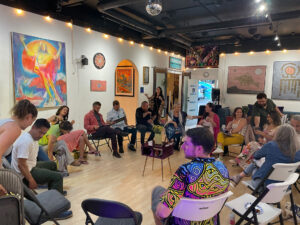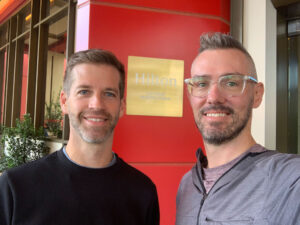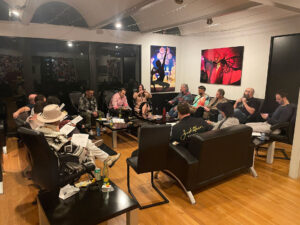Cannabis Cafes: California’s Next Chapter in Cannabis Culture
Is California becoming the new Amsterdam? Earlier this year, San Francisco’s Assemblyman Matt Haney introduced a new bill that would allow dispensaries to sell non-cannabis-infused food and beverages and allow cannabis consumption on site– aka cannabis cafes.
Assembly Bill AB 374 passed with a bipartisan vote of 64-9 and is now headed to the Senate before it hits Governor Newsom’s desk for a final stamp of approval. The bill provides new opportunities for the legal realm of cannabis businesses, which have been struggling to compete with the booming black market and outrageous taxes.
While heading to a bar to enjoy alcoholic drinks and pub food has been a cultural norm for decades, cannabis connoisseurs have yet to experience the perks of consumption and culinary arts.
Background on Cannabis Legalization in CA
It all began in 1996 when California became the first state in the United States to legalize medical marijuana through Proposition 215, also known as the Compassionate Use Act. This landmark law allows patients with qualifying medical conditions to access and use cannabis for therapeutic purposes.
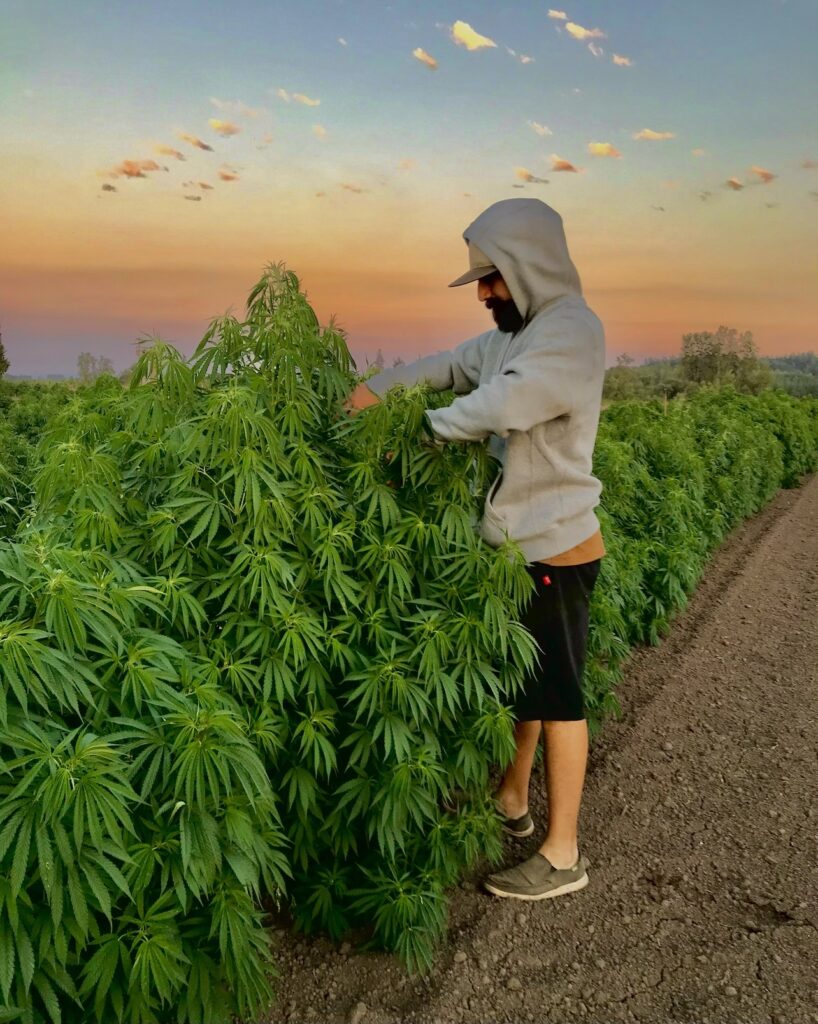
Inner Circle member Cydney Nelson visiting her friends’ cannabis farm in Oregon.
Fast forward to November 2016, and another groundbreaking moment arrived with the passage of Proposition 64, also known as the Adult Use of Marijuana Act (AUMA). Prop 64 opened up a new world of possibilities for cannabis businesses, including establishing consumption lounges where adults can safely and legally consume cannabis.
Despite the existing legalization of consumption lounges, current laws are complex and do not allow for just any dispensary to open up a consumption area. And for the ones who are currently operating, food and drinks are out of the question.
It’s important to note that local jurisdictions have the authority to regulate or ban cannabis-related businesses, including consumption lounges. Therefore, whether cannabis smoking is allowed in cannabis business locations would depend on the regulations set by the specific city or county where the lounge is located.
The California Bureau of Cannabis Control has the most up-to-date information regarding which States and Counties’ cannabis businesses may operate and how to apply for licensing and permits.
Overview of the Cannabis Cafe Bill AB-374
Assembly Bill 374 is a new legislative proposal in California that aims to enhance the experience of cannabis consumers and potentially save the struggling legal cannabis market.
Similar to SB-285, AB-374 will allow dispensaries to prepare and sell non-cannabis-infused culinary delights and beverages alongside cannabis consumption. The Assembly bill also introduces an exciting addition, which would allow live performances to take place at these locations.
If approved, dispensaries must still abide by their local rules and regulations. It should also be noted that alcohol and tobacco use and sale will be strictly prohibited at these locations.
While legally operating dispensaries will have the option to upgrade their services, regular cafes and restaurants such as Starbucks will not be able to start selling marijuana or allowing for cannabis consumption.
Benefits of Cannabis Cafes in CA
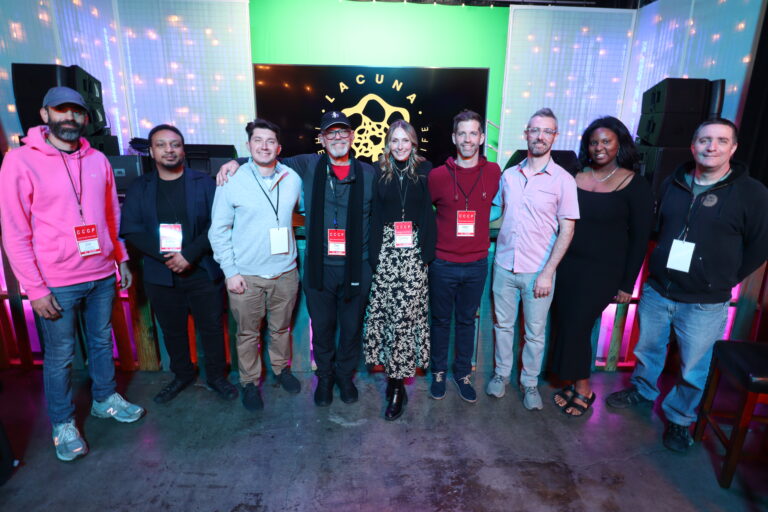
Cannabis cafes can potentially bring several benefits to the legal cannabis industry and the communities they serve.
- Revitalize the Struggling Legal Cannabis Market: One key advantage of cannabis cafes is the opportunity to revitalize the struggling legal cannabis market, which has been grappling with issues such as oversaturation and competition from the black market. By diversifying their offerings to include non-cannabis foods and drinks, these cafes can tap into a broader customer base and attract individuals who may not be regular cannabis consumers.
- Stimulate the Job Market: Expanding existing cannabis dispensaries into consumption lounges that sell food and drinks or host live performances will create new employment opportunities and support local artists. Additionally, the ability to sell event tickets and carry various food and drink products will increase the revenue for existing businesses.
- Contribute to Breaking the Stigma: Cannabis cafes would help normalize cannabis use and remove some of the stigmas around cannabis users. While many believe all cannabis smokers are lazy stoners, many are parents and successful business owners. These spaces would also promote alcohol-free events by providing alternative social gathering options for those who prefer to avoid alcohol-related activities.
Overall, cannabis cafes hold the potential to foster economic growth, enhance community engagement and offer unique experiences within the legal cannabis industry. While cannabis-related entertainment events already exist, many are operating in a legal grey area.
Potential Concerns and Challenges
The proposed Cannabis Cafe bill has sparked concerns and challenges among individuals within and outside of the cannabis industry. Following the bill’s announcement, many citizens took to Twitter to push back against Matt Haney, the Assemblyman who introduced the Cannabis Cafe bill in San Francisco.
Our Cannabis Cafe bill just flew off the Assembly floor with bipartisan support.
— Matt Haney (@MattHaneySF) May 31, 2023
California’s small cannabis businesses are struggling. Issues like over-saturation, high taxes, and the thriving black market are hurting cannabis businesses who follow the rules and pay taxes.
In… pic.twitter.com/zH1pc15mwF
Some fear they will now face higher taxes and prices to purchase cannabis products, while others worry that the cafes will promote drug use and contribute to intoxicated people on the streets.
Moreover, secondhand smoke and violating smoke-free work zone laws also concern many citizens. While ventilation systems can help mitigate some of the risks, research suggests they will not be enough to protect employees and patrons fully from secondhand smoke toxins.
These concerns and challenges highlight the need for careful consideration and comprehensive regulations to address potential drawbacks while maximizing the benefits of cannabis cafes.
Navigating the Road Ahead
The introduction of AB 374, the Cannabis Cafe bill, represents a significant development in California’s evolving cannabis landscape. The potential legalization of cannabis consumption lounges with the allowance for non-cannabis food and drink sales opens up new opportunities for entrepreneurs and businesses in the plant medicine industry.
While there are concerns and challenges to address, such as taxation, drug-related tourism and secondhand smoke– careful regulation and planning can help mitigate these issues.
As the industry continues to evolve, platforms like Inner Circle provide valuable resources, connections and support for those looking to navigate the changing landscape.
By staying informed and collaborating within communities like Inner Circle, industry professionals can work together to foster responsible growth, innovation, and the realization of the full potential of cannabis cafes and the broader cannabis industry.






